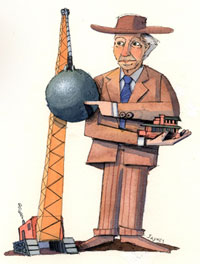|
||
      |
Peer Review ::
From our pages
 1912 The Gymnasium Committee of the Alumni Club wrote to the Magazine in May, observing that women had no gym, only a succession of temporary and inadequate rooms. Lexington Hall, with 11 rooms, was the only campus building reserved for the 1,075 women enrolled. “Give us a women’s building worthy of this great institution,” exhorted the committee. The good news: the July issue reported that at June convocation, President Judson announced plans to build a women’s gymnasium—Ida Noyes Hall—“without delay.”
1912 The Gymnasium Committee of the Alumni Club wrote to the Magazine in May, observing that women had no gym, only a succession of temporary and inadequate rooms. Lexington Hall, with 11 rooms, was the only campus building reserved for the 1,075 women enrolled. “Give us a women’s building worthy of this great institution,” exhorted the committee. The good news: the July issue reported that at June convocation, President Judson announced plans to build a women’s gymnasium—Ida Noyes Hall—“without delay.”
1957 “I think this is a special species of vandalism,” bellowed an 87-year-old Frank Lloyd Wright. Quoted in the May issue, Wright was reacting to the Chicago Theological Seminary’s proposal to raze the Robie House to create a married-students’ dormitory. Wright made a special visit to campus in support of the building, one of his first Prairie-style houses. “To destroy it would be like destroying a great piece of sculpture or a great work of art,” Wright immodestly pronounced. Real-estate firm Webb & Knapp rescued the home, using it as an office before donating it to the University in 1963.
1982 “I wrote my first composition in Burton-Judson,” musician Philip Glass, AB’56, reminisced. He was 15 and a mathematics major. “I saw musical scores for the first time here, in the library.” Glass, profiled in the Summer issue and noted for his minimalist style—repetition and, wrote the Magazine, “drone-like” sounds—performed with his ensemble in Mandel Hall that spring. Touring the quads with Magazine contributor David Blair Toub, AB’83, during his visit, Glass noted how similar the campus looked to his undergraduate days—with one exception. “Where’s Stagg Field?” he asked Toub as they strolled down 57th Street. “Obviously, Philip Glass needs to return to the University of Chicago more often,” concluded the article.
1997 Along with the other seven winners of the first Norman Maclean Faculty Awards, given to acclaimed emeriti or senior faculty, English professor Wayne Booth, AM’47, PhD’50, shared his thoughts on teaching in the June Magazine. “What I learned here was the importance of dialogue in which the teacher doesn’t have total control and the students’ ideas count.”